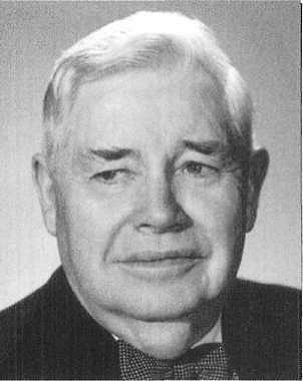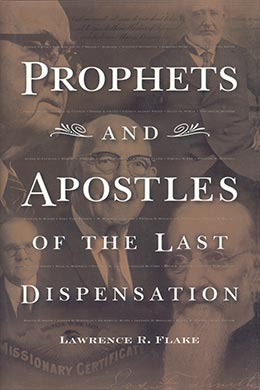Joshua Reuben Clark Jr.
Lawrence R. Flake, Prophets and Apostles of the Last Dispensation (Provo, UT: Religious Studies Center, Brigham Young University, 2001), 203–7.

Born: 1 September 1871, Grantsville, Utah
Second counselor to President Heber J. Grant: 6 April 1933 (age 61)
First counselor to President Heber J. Grant (ordained an apostle with standing in the Quorum of the Twelve): 6 October 1934
First counselor to President George Albert Smith: 21 May 1945
Second counselor to President David O. McKay: 9 April 1951
First counselor to President David O. McKay: 12 June 1959
Died: 6 October 1961 (age 90), Salt Lake City, Utah
In 1903 when Joshua Reuben Clark Jr. traveled to New York City to enter Columbia Law School, Brother James E. Talmage, president of the University of Utah, said, “He possesses the brightest mind ever to leave Utah.” His remarkable intellectual capacity, coupled with a prodigious stamina, made it possible for Brother Clark to excel in a wide variety of endeavors.
He was born of pioneer parentage in Grantsville, Utah, learning there to work hard and skimp during the lean, dry years of that community’s history. The quaint country school, which Brother Clark later restored at his own expense as a historical landmark and gift to the town, was the cradle of his giant intellect. Despite the difficulty of leaving the family farm in Grantsville where he was sorely needed, Reuben moved to Salt Lake City and entered Latter Day Saints’ College in the fall of 1890. There he came under the tutelage of James E. Talmage, who two years later offered him a position as assistant curator of the Deseret Museum with the particular stipulation that his service there would count as a mission for the Church. Reuben accepted this responsibility. [1] In 1898, while attending the University of Utah, he married Luacine (Lute) Savage. He graduated from the University, completing the equivalent of six years of classes in four years. The couple then moved to New York City where he obtained a law degree from Columbia in 1906. He practiced successfully in New York City, Washington, D.C., and Salt Lake City, frequently staying up all night studying precedents and preparing briefs. In 1971 the First Presidency announced that Brigham Young University’s new law school would be named in his honor—a fitting tribute to this outstanding facet of his life.
President Clark’s talents did not go unrecognized in public life. His seemingly interminable resources were tapped by seven presidents of the United States—Presidents Theodore Roosevelt, Taft, Wilson, Harding, Coolidge, Hoover, and Franklin D. Roosevelt—who appointed him to such prominent positions as Under Secretary of State and United States Ambassador to Mexico. He was renowned among his associates for his knowledge of international law. Elder Henry D. Moyle wrote: “There is no finer example of a man who has risen through sheer merit in the whole history of the foreign service.” [2] He hated corruption and political favor; he was said to have had no regard for a person’s wealth or position but honored people according to character.
Although Reuben had felt strongly for many years that issues of church and state should be kept separate, when his own call came from President Heber J. Grant in December 1931 to be second counselor in the First Presidency, his strong loyalty to the Church compelled him to accept the call. Yet he felt he could not immediately relinquish his duties as Ambassador to Mexico without serious consequences to both his and the Church’s reputation and did not, therefore, enter the First Presidency until April 1933. [3] He served as second counselor to President Grant for eighteen months before he was called and ordained an apostle and given standing in the Quorum of the Twelve. At that time he also replaced President Anthony R. Ivins as first counselor to President Grant, though the new second counselor, David O. McKay, was far his senior in the Quorum of the Twelve. President George Albert Smith, succeeding President Grant, retained the same two counselors during his presidency. When David O. McKay became president of the Church in 1951, he returned President Clark to the slot of second counselor for a time, which caused some people concern, but it was a decision which President Clark accepted gracefully. The situation occasioned what was probably his most noted statement: “In the Church it’s not where we serve, but how.” After the death of President McKay’s first counselor, Stephen L Richards, President Clark became first counselor again, a position he retained until his death in 1961 at age ninety.
After his call to the First Presidency, President Clark was by no means forgotten in Washington. Not understanding the commitment of his church calling, many former associates in high positions sought to appoint him to various boards, presidencies, and delegations. President Grant, feeling as he did with Elder Reed Smoot that having a high profile member of the Church involved in important national concerns was beneficial to the Church, encouraged President Clark to accept many of these responsibilities. Several times he came close to receiving high government office, the most impressive of which would have been Secretary of State had Alfred Landon, Republican candidate for president of the United States in 1936, been elected. [4] Twice he was almost drafted to run for the United States Senate, but both times he was torn between such an honor and his duties and responsibilities to the Church. As President Grant and later President George Albert Smith in their respective terms became increasingly feeble, the main duties of the First Presidency fell to President Clark, and any political aspirations he may have had earlier in his life became more and more remote. But he was always thought of and often honored as an “elder statesman,” one of the most competent public servants of his time.
J. Reuben Clark’s incredible administrative talents came to the fore as he urged President Grant to delegate more responsibility, to limit his accessibility to the public, to lengthen the terms of bishops, and to curtail spending of Church funds. [5] President Clark was the decisive force behind successfully withdrawing all missionaries from Europe before the calamities of Hitler’s regime bore sway. [6] Other initiatives of President Clark’s long tenure in the First Presidency included appointing Assistants to the Twelve, overhauling the Church’s budget, using ward chapels for more than one congregation, creating regions to administer Church welfare and other programs, holding regional priesthood meetings or solemn assemblies, organizing regional councils to act as go-betweens for stake presidents and general authorities, and broadcasting conference to outlying areas of the Church. [7] He authored several masterfully written literary works, Man, God’s Greatest Miracle, Why the King James Version, Our Lord of the Gospels, and On the Way to Immortality and Eternal Life.
In spite of his eminent position in the First Presidency, where he served brilliantly and devotedly for twenty-three years, he was ever conscious of the predominant role held by each president of the Church, and he never presumed to usurp that authority. [8] He won the profound admiration of members throughout the Church. Elder Hugh B. Brown fittingly said, “President Clark’s stature was such that no single article, in fact, no biography could do him justice though it should be written by a modern Boswell.” [9]
Notes
[1] David H. Yarn Jr., Young Reuben: The Early Life of J. Reuben Clark, Jr. (Provo, UT: Brigham Young University Press, 1973), 60.
[2] Henry D. Moyle, “President J. Reuben Clark, Jr. Called Back as a Counselor in the First Presidency of the Church,” Relief Society Magazine, June 1951,374.
[3] D. Michael Quinn, J. Reuben Clark: The Church Years (Provo, UT: Brigham Young University Press, 1983), 39–42.
[4] Quinn, J. Reuben Clark, 74–75.
[5] Quinn, J. Reuben Clark, 72–73, 79, 103.
[6] Quinn, J. Reuben Clark, 81–82.
[7] Quinn, J. Reuben Clark, 87, 88–90, 111, 134, 272.
[8] Quinn, J. Reuben Clark, 85, 89.
[9] Hugh B. Brown, “In Memoriam—President J. Reuben Clark, Jr.,” Relief Society Magazine, December 1961, 789.
